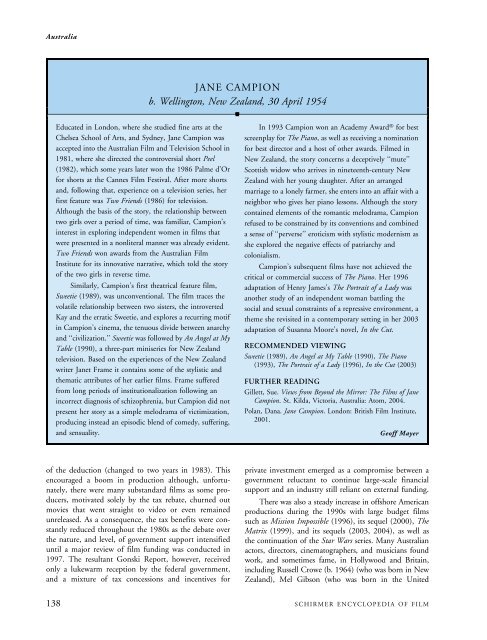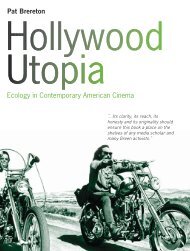Schirmer Encyclopedia of Film
Schirmer Encyclopedia of Film
Schirmer Encyclopedia of Film
Create successful ePaper yourself
Turn your PDF publications into a flip-book with our unique Google optimized e-Paper software.
Australia<br />
Educated in London, where she studied fine arts at the<br />
Chelsea School <strong>of</strong> Arts, and Sydney, Jane Campion was<br />
accepted into the Australian <strong>Film</strong> and Television School in<br />
1981, where she directed the controversial short Peel<br />
(1982), which some years later won the 1986 Palme d’Or<br />
for shorts at the Cannes <strong>Film</strong> Festival. After more shorts<br />
and, following that, experience on a television series, her<br />
first feature was Two Friends (1986) for television.<br />
Although the basis <strong>of</strong> the story, the relationship between<br />
two girls over a period <strong>of</strong> time, was familiar, Campion’s<br />
interest in exploring independent women in films that<br />
were presented in a nonliteral manner was already evident.<br />
Two Friends won awards from the Australian <strong>Film</strong><br />
Institute for its innovative narrative, which told the story<br />
<strong>of</strong> the two girls in reverse time.<br />
Similarly, Campion’s first theatrical feature film,<br />
Sweetie (1989), was unconventional. The film traces the<br />
volatile relationship between two sisters, the introverted<br />
Kay and the erratic Sweetie, and explores a recurring motif<br />
in Campion’s cinema, the tenuous divide between anarchy<br />
and ‘‘civilization.’’ Sweetie was followed by An Angel at My<br />
Table (1990), a three-part miniseries for New Zealand<br />
television. Based on the experiences <strong>of</strong> the New Zealand<br />
writer Janet Frame it contains some <strong>of</strong> the stylistic and<br />
thematic attributes <strong>of</strong> her earlier films. Frame suffered<br />
from long periods <strong>of</strong> institutionalization following an<br />
incorrect diagnosis <strong>of</strong> schizophrenia, but Campion did not<br />
present her story as a simple melodrama <strong>of</strong> victimization,<br />
producing instead an episodic blend <strong>of</strong> comedy, suffering,<br />
and sensuality.<br />
<strong>of</strong> the deduction (changed to two years in 1983). This<br />
encouraged a boom in production although, unfortunately,<br />
there were many substandard films as some producers,<br />
motivated solely by the tax rebate, churned out<br />
movies that went straight to video or even remained<br />
unreleased. As a consequence, the tax benefits were constantly<br />
reduced throughout the 1980s as the debate over<br />
the nature, and level, <strong>of</strong> government support intensified<br />
until a major review <strong>of</strong> film funding was conducted in<br />
1997. The resultant Gonski Report, however, received<br />
only a lukewarm reception by the federal government,<br />
and a mixture <strong>of</strong> tax concessions and incentives for<br />
JANE CAMPION<br />
b. Wellington, New Zealand, 30 April 1954<br />
In 1993 Campion won an Academy AwardÒ for best<br />
screenplay for The Piano, as well as receiving a nomination<br />
for best director and a host <strong>of</strong> other awards. <strong>Film</strong>ed in<br />
New Zealand, the story concerns a deceptively ‘‘mute’’<br />
Scottish widow who arrives in nineteenth-century New<br />
Zealand with her young daughter. After an arranged<br />
marriage to a lonely farmer, she enters into an affair with a<br />
neighbor who gives her piano lessons. Although the story<br />
contained elements <strong>of</strong> the romantic melodrama, Campion<br />
refused to be constrained by its conventions and combined<br />
a sense <strong>of</strong> ‘‘perverse’’ eroticism with stylistic modernism as<br />
she explored the negative effects <strong>of</strong> patriarchy and<br />
colonialism.<br />
Campion’s subsequent films have not achieved the<br />
critical or commercial success <strong>of</strong> The Piano. Her 1996<br />
adaptation <strong>of</strong> Henry James’s The Portrait <strong>of</strong> a Lady was<br />
another study <strong>of</strong> an independent woman battling the<br />
social and sexual constraints <strong>of</strong> a repressive environment, a<br />
theme she revisited in a contemporary setting in her 2003<br />
adaptation <strong>of</strong> Susanna Moore’s novel, In the Cut.<br />
RECOMMENDED VIEWING<br />
Sweetie (1989), An Angel at My Table (1990), The Piano<br />
(1993), The Portrait <strong>of</strong> a Lady (1996), In the Cut (2003)<br />
FURTHER READING<br />
Gillett, Sue. Views from Beyond the Mirror: The <strong>Film</strong>s <strong>of</strong> Jane<br />
Campion. St. Kilda, Victoria, Australia: Atom, 2004.<br />
Polan, Dana. Jane Campion. London: British <strong>Film</strong> Institute,<br />
2001.<br />
Ge<strong>of</strong>f Mayer<br />
private investment emerged as a compromise between a<br />
government reluctant to continue large-scale financial<br />
support and an industry still reliant on external funding.<br />
There was also a steady increase in <strong>of</strong>fshore American<br />
productions during the 1990s with large budget films<br />
such as Mission Impossible (1996), its sequel (2000), The<br />
Matrix (1999), and its sequels (2003, 2004), as well as<br />
the continuation <strong>of</strong> the Star Wars series. Many Australian<br />
actors, directors, cinematographers, and musicians found<br />
work, and sometimes fame, in Hollywood and Britain,<br />
including Russell Crowe (b. 1964) (who was born in New<br />
Zealand), Mel Gibson (who was born in the United<br />
138 SCHIRMER ENCYCLOPEDIA OF FILM
















